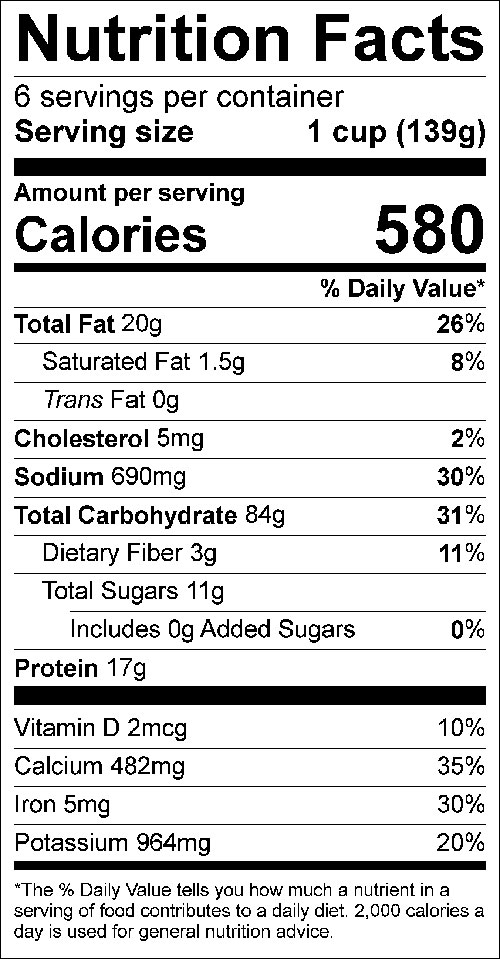Bulletin #4370, Diabetes, Carbohydrates and You: Using Food Labels With Diabetes
Developed by the UMaine Cooperative Extension Diabetes Education Committee, including Nellie Hedstrom, nutrition specialist, UMaine Cooperative Extension; Patricia Pierson, Extension educator, UMaine Cooperative Extension; Susan Henner, Extension nutrition aide, UMaine Cooperative Extension; Cheryl Paul, Extension nutrition aide, UMaine Cooperative Extension; and Lucinda Hale, Diabetes Prevention & Control Program, Maine Department of Human Services.
For information about UMaine Extension programs and resources, visit extension.umaine.edu.
Find more of our publications and books at extension.umaine.edu/publications/.
Food Labels Help
The nutrition labels on food packages give you information you need for carbohydrate counting. Look at the label and find what it tells you.
Serving Size
Note that the serving size on this label is one cup. All the information on the label is based on this portion. If you eat double the serving size, or two cups, you will eat double the carbohydrates, other nutrients, and calories.
Servings Per Container
The number of servings in the package is six.
Total Carbohydrate
The total amount of carbohydrate in one serving of this food is 84 grams. Use total carbohydrate when counting carbohydrate choices. Eating one serving of the food in this package equals 5 1/2 carbohydrate choices.
Remember: Carbohydrate grams = Carbohydrate choices
- 15 grams = 1 choice
- 30 grams = 2 choices
- 45 grams = 3 choices
Food Label Quiz
Use the label! What does the label tell you that will help you plan meals for a person with diabetes?
1. What is the serving size of this food? _____
2. How many servings are in this package? _____
3. How many grams of carbohydrate does one serving of this food contain? _____
4. One serving of this food counts as how many carbohydrate choices? _____
For more information, contact your UMaine Extension county office.
Answers below.
Information in this publication is provided purely for educational purposes. No responsibility is assumed for any problems associated with the use of products or services mentioned. No endorsement of products or companies is intended, nor is criticism of unnamed products or companies implied.
© 2002, 2009
Call 800.287.0274 (in Maine), or 207.581.3188, for information on publications and program offerings from University of Maine Cooperative Extension, or visit extension.umaine.edu.
In complying with the letter and spirit of applicable laws and pursuing its own goals of diversity, the University of Maine System does not discriminate on the grounds of race, color, religion, sex, sexual orientation, transgender status, gender, gender identity or expression, ethnicity, national origin, citizenship status, familial status, ancestry, age, disability physical or mental, genetic information, or veterans or military status in employment, education, and all other programs and activities. The University provides reasonable accommodations to qualified individuals with disabilities upon request. The following person has been designated to handle inquiries regarding non-discrimination policies: Director of Equal Opportunity and Title IX Services, 5713 Chadbourne Hall, Room 412, University of Maine, Orono, ME 04469-5713, 207.581.1226, TTY 711 (Maine Relay System).
Answers to quiz: (1) 1 cup, (2) 6 servings, (3) 84 grams, (4) 5 1/2 carbohydrate choices


